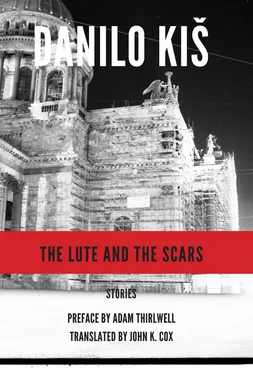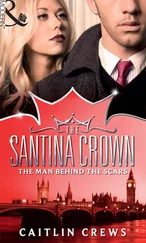I sensed that my words were coming across as hollow and bookish; it’s not easy to respond to a person whose question is “Why should I be alive?” I was acting with the best of intentions: drawing on my own experiences, I wanted to make clear to him the beneficial effects of time, and to sketch the future out for him, his future: sitting somewhere on the Mediterranean coast, warming his bones in the spring sun, drinking cappuccino and patting the young waitresses on their rear ends.
“When all is said and done, you have to live, because this is the only life there is.”
He waved his hand dismissively.
“Don’t forget that I believe in God,” he said. “And He’ll forgive me.”
This trying conversation was interrupted by the ringing of the doorbell. Jurij Golec introduced his guests to me by name and added: “My protegées .”
He indicated to them that we were old friends and I was a writer.
“He wrote the foreword to my last book,” I said, in order to conceal my embarrassment.
They were two pretty young women, with luxurious hair, pronounced cheekbones, and slightly tilted Tatar-like eyes.
“Oh, Jura, why didn’t you tell us?” Nataša said.
“You see?” Dola continued. (She owed her name to Dolores Ibarruri.) “You at least have other people to live for! What vile things you’ve been saying! What do you mean, a pistol? Boh s tobój !” She then turned to me: “If Jurij wrote a foreword to your book, then it must be good.”
I promised to send them copies of my books; the one with the foreword by Jurij Golec and, of course, the one about the camps. (They were the daughters of a Soviet general who had perished in the purges.)
“Cheers!” Nataša said after pouring everyone a drink.
“To your health,” Jurij Golec responded absentmindedly.
“There are,” Dola said, “so many beautiful things in this life. Friendship, for example. And, you see, we all need you. If you didn’t exist, where would we two have taken refuge when we got to Paris? You can’t even imagine what all Jura has done for us. His apartment is a veritable embassy for refugees from all over the East. For Russians, Poles, Ukrainians, Estonians. For everyone. How long have you known Jura?”
“For at least ten years,” I said.
“We met at a reception, a long time ago,” said Jurij Golec. “When his first book came out in French.”
Note : This reception had been organized by Mme Ursula Randelis, a patron of South American writers. In addition to those writers, authors from other countries passed through the side door, so to speak. The cocktail party took place on the occasion of a book launch, for a Portuguese, a Spaniard, and me; the books came out in a series devoted primarily to Latin American writers. I knew no one and didn’t dare to eat anything, because I didn’t know how to break open and eat crabs and shellfish; so I sat there the entire evening with a canapé and drank. At three o’clock in the morning a young woman suggested driving me to her place, and I threw up in her bathroom, lying there on the floor, half-dead. Fortunately, people forget things that are earmarked for oblivion. Over the course of the years the memory of that hapless reception had evaporated, and an insuperable obscurity would have descended upon it if Jurij Golec hadn’t brought it up again two or three months ago. He asked me whether Marie La Coste had written anything about my new book. I told him I didn’t know who that was. “Chivalry is an attractive personality trait to have, my dear friend, but you know you slept with her. This is an open secret. At that reception chez Ursula Randelis, you kissed her hand under her husband’s nose. And toward daybreak the two of you ducked out.”
“I thought she was one of Mme Randelis’s domestics,” I said. “I was actually amazed myself at how large her bathroom was. With pink tiles and a bidet.”
To steer the conversation to other topics, I stated:
“I think that you two should persuade him not to go on living in this apartment.”
“You see, Jura? Everybody agrees that it’s not a good idea for you to live in her apartment,” said Nataša. “We’ve told him that a hundred times.”
“Just until the formalities are complete,” Jurij Golec said.
“So, in the meantime let’s get to work,” said Dolores-Dola, and the two women stood up simultaneously. “The sculptures are gone. That’s good. Never mind the ashtrays, Jura; I’ll empty them. What do we do with this?”
We were standing in the next room, where Noémie’s library was housed. The books were arranged over an entire wall, stretching all the way up to the ceiling.
“These are valuable books,” Jurij Golec said, taking down a volume of The Jewish Encyclopedia .
The women ran their eyes over the shelves and each of them pulled out a book at random.
“These are new books,” Dola said. “Tomorrow we’ll take whatever interests you over to the apartment by car. As for the rest — the used bookstore!”
Jurij Golec was standing in the middle of the room with a volume of the Encyclopedia still in his hand, not knowing what to do with it.
“Some of them are autographed,” he remarked.
“It’s not like she’s got one signed by Victor Hugo,” Nataša said. She was crouched down on the floor, running her fingers over the worn carpet in Noémie’s room as though picking a fabric swatch. “This is a Persian,” she said and pointed to the carpet in front of the dressing table, upon which, as in a poem by Baudelaire, little glass perfume bottles were lined up.
“Tomorrow we’ll come with the car for all that,” she said. “Vladimir Edmundovich, M. Brauman, and the two of us. Do you see, Jura? Everything will be taken care of.”
“And what’s in there?” Dola asked, indicating the cabinets in the foyer.
“Her stuff,” Jurij Golec said after laying the encyclopedia down on the radiator and opening one of the cabinet doors. “Toward the end she was buying fur coats. She complained about the cold. She even wore them around the apartment. She claimed that she was feeling the effects of the extreme cold that got into her bones forty years ago in Siberia. Pustjaki ,” he added with a dismissive wave. “She was thinking of moving to Africa permanently.”
“There are some good furs here,” Dola noted. “They should also be sold. This one alone cost at least 20,000 francs.”
Jurij Golec added: “120,000. She only wore it once. Last year. For Yom Kippur.”
“For what?”
“For a holiday.”
“There are at least thirty pairs of shoes here,” Dola said.
“In Russia,” said Nataša (who had emigrated only recently and was still making use of anti-communist propaganda), “this could all be sold for hard currency in a Beryozka .”
“ Boh s tobój !” cried Dolores-Dola. “What do you mean, a Beryozka ? We should donate this to the Red Cross.”
“Maybe some of it, via the Croix Rouge , will make it to Afghanistan,” Jurij Golec said, casting a glance at the clock.
Then the doorbell rang.
“Doctor Wildgans,” he said, as if to himself.
Dr. Wildgans was a tall man of approximately thirty, with curly, luxuriant hair, already decorated with patches of white. There was something wild about him, something “Bedouin-like”—and not simply on account of the unusual color of his eyes, greenish-yellow, and the large shawl that he had tossed over his shoulders. Two weeks ago he had returned from Afghanistan. He had crossed the border with two other doctors and, dressed as a combatant, trekked through trackless mountains. He had observed ambushes from his hiding place; and through binoculars he had watched armored vehicles be abandoned by their crews; he carried out a number of amputations in a tent, under the most primitive conditions, about a hundred kilometers outside of Kabul.
Читать дальше












